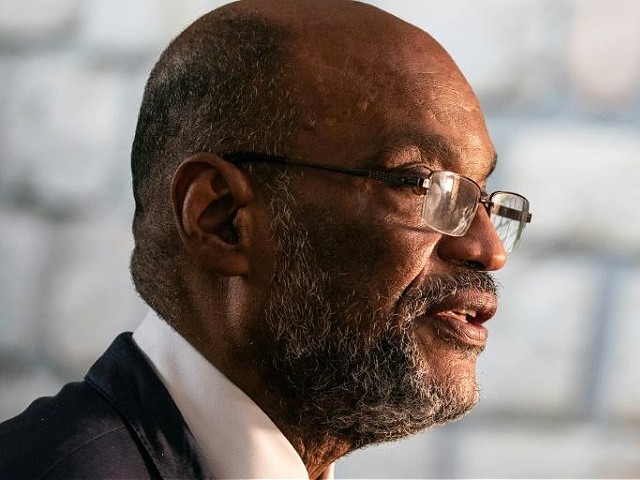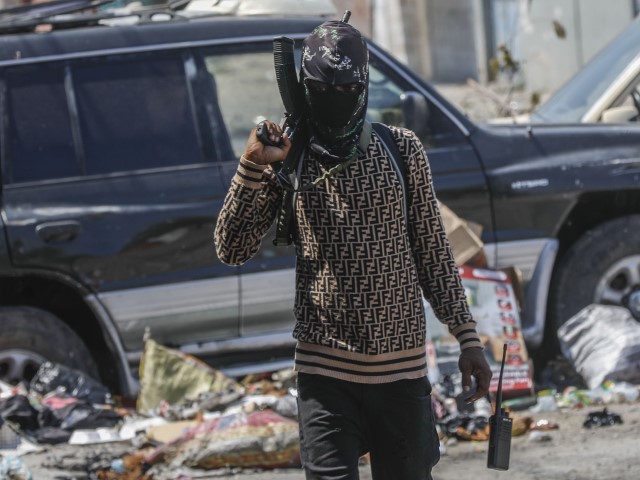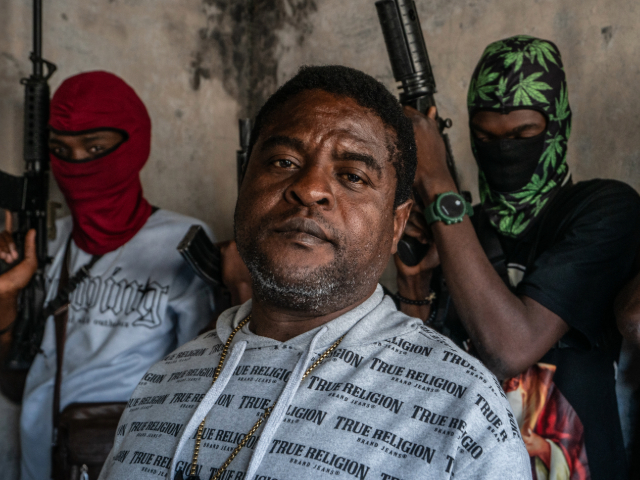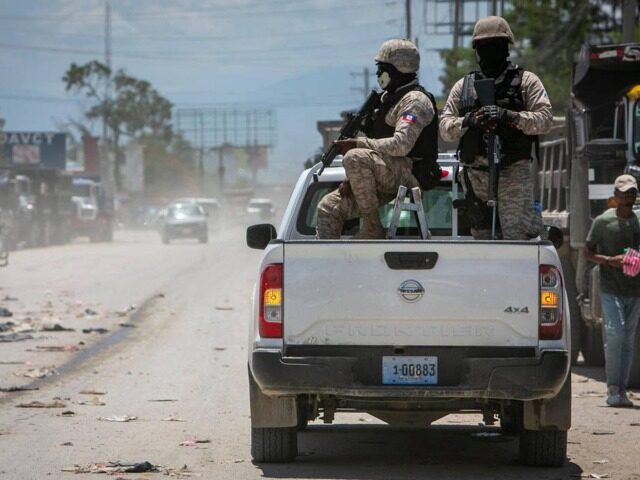The U.S. Southern Command (SOUTHCOM) announced on Wednesday that the Marine Fleet Anti-Terrorism Security Team (FAST) has been deployed to Haiti to “maintain strong security capabilities at the U.S. Embassy in Port-au-Prince.”
SOUTHCOM said deploying a team like FAST to a theater where the U.S. Embassy is at risk is a “common and routine practice worldwide” that will relieve the pressure on Marine guards already in place and “allow additional non-emergency personnel to depart.”
“The U.S. Embassy remains open, and limited operations continue, focused on assistance to U.S. citizens and supporting Haitian-led efforts to secure a peaceful transition of power,” the statement said, referring to Monday’s announced resignation of Haitian Prime Minister Ariel Henry.

Ariel Henry (VALERIE BAERISWYL/AFP via Getty Images)
Haiti, already unstable and infested by brutal street gangs, exploded into violence when Henry left the country to secure a deal for security intervention with Kenyan President William Ruto. Gang leaders declared a “bloody revolution” and blocked Henry from returning to the country. Henry is currently stranded in Puerto Rico.
The deal with Kenya, meanwhile, was scuttled by Kenyan courts and the pronounced lack of enthusiasm for intervening in Haiti among Ruto’s constituents.
SOUTHCOM said:
This week, the Department of Defense doubled our funding for the Multinational Security Support (MSS) mission, and we are working with Haitian, Kenyan, and other partners to expedite its deployment to support the Haitian National Police and to restore security in Haiti.
It remains unclear who will put boots on the ground for that multinational mission.
The exact details of Henry’s resignation are still being hammered out, and the gangs could launch a fresh rampage if he does not depart soon. U.S. and Caribbean officials seem nervous that the gangs could declare victory for toppling Henry and seize power for themselves if his departure is too abrupt.

An armed member of the G9 and Family gang patrols a roadblock in the Delmas 6 neighborhood of Port-au-Prince, Haiti, on March 11, 2024. (Odelyn Joseph/AP)
U.S. State Department spokesman Matthew Miller on Tuesday commended Henry for his “statesmanship” in “putting his country first and agreeing to step down when the transitional presidential council is established.”
Miller expected the transitional council to be formed soon — setting a timetable of “24 to 48 hours” that would prove incorrect — and Henry would resign soon after the council named an interim prime minister.
“It’s not a question of a United States deadline,” Miller said irritably when reporters pressed him for a more exact schedule. “This will be a Haitian-led process.”
That “Haitian-led process” seemingly collapsed on Thursday, as a pivotal member of the transition council withdrew his support.
Jean Charles Moise, a former Haitian senator who has become the respectable proxy for former rebel leader Guy Philippe, said on Wednesday that he rejected the international community’s plan for a transitional council. Instead, he insisted on a three-person council that would include only himself, Philippe, and a Haitian judge.
“We are not going to negotiate it,” he said of his demand for a three-person transition council. “We have to make them understand.”
Philippe, who recently emerged from U.S. prison after serving time for money laundering, is seen as a key interlocutor between the Haitian government and gang leaders. He released a social media video on Tuesday urging Haitians to take to the streets and protest against the transition plan laid out by CARICOM, an association of Caribbean nations the Biden administration seems to be putting in charge of the Haitian disaster. Philippe railed that CARICOM was in league with corrupt Haitian elites.
“The decision of CARICOM is not our decision. Haitians will decide who governs Haiti,” he declared.
Several other groups of important Haitian leaders also rejected the CARICOM transition plan, countering with their own demands for forming an interim government.
A senior U.S. official on Tuesday said the United States and “the vast majority of the international community” would find it “worrisome” if Philippe takes power in Haiti.
Meanwhile, gang leader Jimmy “Barbecue” Cherizier said on Tuesday that his forces would begin hunting down other Haitian politicians besides Henry. He warned hotel owners not to risk their lives and property by attempting to shelter his targets.

Gang leader Jimmy “Barbecue” Cherizier with G-9 federation gang members in the Delmas 3 area on February 22, 2024, in Port-au-Prince, Haiti. (Giles Clarke/Getty Images)
“We are coming for you,” he said. “We won’t lie to people, saying we have a peaceful revolution. We do not have a peaceful revolution. We are starting a bloody revolution in the country.”

COMMENTS
Please let us know if you're having issues with commenting.